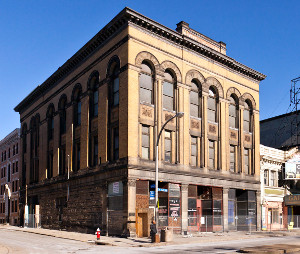 City of Asylum has closed on the purchase of the historic Masonic Building from the Urban Redevelopment Authority. The building has been vacant since the mid-1990’s and is an anchor to the revitalization of the Garden Theater Block and the Federal-North area. Construction will begin immediately and is scheduled to take 10 months.
City of Asylum has closed on the purchase of the historic Masonic Building from the Urban Redevelopment Authority. The building has been vacant since the mid-1990’s and is an anchor to the revitalization of the Garden Theater Block and the Federal-North area. Construction will begin immediately and is scheduled to take 10 months.
“City of Asylum is already a wonderful North Side institution and I am thrilled at this next step in their evolution. This project will be key to the continued rebirth of the Federal North corridor, which is one of the key entryways not only to the North Side but the city as a whole,” said Mayor William Peduto. “Our goal with this project is to create a neighborhood and regional hub for readers and writers and global culture as well as a social space full of interesting people and interesting happenings,” added co-founder Henry Reese.
Renovation of the building will cost $10 million. It will include 8 income-generating apartments and Alphabet City, the organization’s new home.
“Until now, City of Asylum has had to program catch-as-catch can – under tents on streets and on vacant lots, in houses and gardens, and in community spaces. With Alphabet City, we can program year-round in a state-of-art, accessible facility,” explained co-founder Diane Samuels. “Alphabet City is also on numerous bus lines and our programs are free to the public, which reduces barriers to entry,” she added.
Alphabet City will be a dynamically flexible space in which the organization will offer literary readings, music, and writing workshops, and be open to community programmers. “Having a home allows us to expand our programming greatly and to feature a broader range of authors and music,” added Silvia Duarte, Programming Director.
Alphabet City will also include a bookstore, specializing in translations. In addition, Casellula Cheese & Wine Café, a popular New York City restaurant, will open up “Casellula in Alphabet City.”
“Financing for the project has been a cooperative effort of private, public, and philanthropic funds, and it has required both imagination and fortitude on the part of all to make this challenging project a reality,” explained City of Asylum co-founder Henry Reese.
Local foundations have made $3.7 million in grants to the project; URA through its Pittsburgh Urban Initiatives affiliate, together with PNC, contributed New Market Tax Credit allocations of $8 million; and the balance is a blend of federal and state historic tax credits, state grants, Community Infrastructure and Tourism Fund, a façade grant, a grant from the Allegheny Regional Asset District, and a loan from The Reinvestment Fund. PNC was also the investor of the New Markets and historic tax credits. Dunham reGroup has been the owner’s representative and project manager. Architects are Loysen + Kreuthmeier Architects for Alphabet City and Indovina Associates, led by Brian Kaminski a longtime Northsider, for the apartments and core and shell. Construction will be by Franjo Construction.
“City of Asylum has enriched Pittsburgh’s cultural life” said Amy Merritt, PNC’s new markets tax credit relationship manager. “Their renovation of this iconic building allows them to expand their work in support of our cultural community while advancing the development momentum that is occurring in the Federal-North corridor.”
About City of Asylum
City of Asylum brings writers, readers and neighbors together through global literature and cultural exchange. Founded in 2004, City of Asylum is known nationally for the innovative ways it has used the arts to transform its community. It has transformed 6 blighted homes into residences for persecuted international writers, built the Alphabet Reading Garden park on 3 vacant lots, and presented over 280 writers and musicians from 57 countries, while creating an arts-animated walkway leading from the Alphabet Reading Garden to Alphabet City.
Sampsonia Way, the publishing arm of City of Asylum, specializes in banned books and anthologies of contemporary writing from countries where free speech is under threat.

Comments are closed.